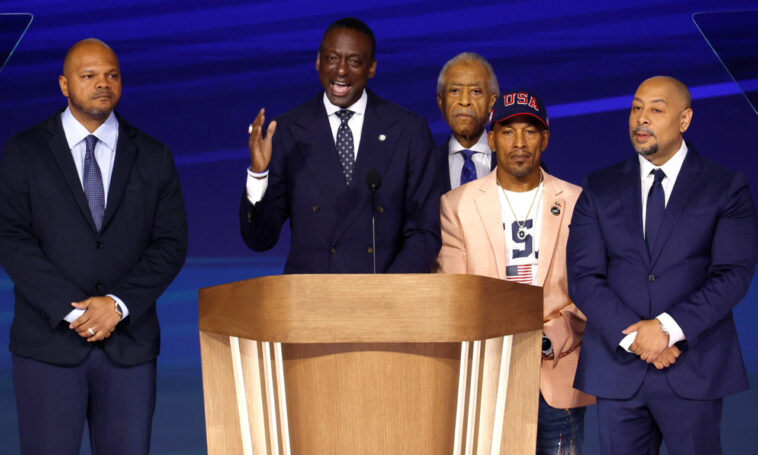Five men who were wrongfully convicted in the infamous Central Park case are suing former President Donald Trump, accusing him of making false and defamatory statements during a public debate. The lawsuit, filed in federal court in Philadelphia, alleges that Trump acted with “reckless disregard” for the truth when he claimed during a debate with Vice President Kamala Harris that the men pleaded guilty to crimes related to the beating and rape of a woman in Central Park in New York City. Trump’s statement, they claim, was not only false but deeply harmful.
During the debate, Trump said that the five teenagers “badly hurt a person, killed a person” during the attack, a claim that the men and their attorneys strongly refute. The lawsuit highlights the fact that none of the five men — Yusef Salaam, Raymond Santana, Kevin Richardson, Antron McCray, and Korey Wise — ever pleaded guilty to the Central Park assaults. The men, who were wrongfully convicted as teenagers in the late 1980s, have always maintained their innocence, both during their trials and throughout their years of incarceration. Furthermore, the lawsuit clarifies that none of the victims of the attack were killed, contradicting Trump’s claims.
The group’s lawyers argue that Trump’s remarks were defamatory in numerous ways, not only damaging the reputations of the men but also causing severe emotional distress. “Plaintiffs never pled guilty to the Central Park assaults,” the lawsuit states. “Plaintiffs all pled not guilty and maintained their innocence throughout their trial and incarceration, as well as after they were released from prison.” The men are seeking compensatory and punitive damages for the harm caused by Trump’s statements, as well as for being placed in a false light by his comments.
Trump’s campaign spokesperson, Steven Cheung, dismissed the lawsuit as “just another frivolous, Election Interference lawsuit,” claiming it was intended to divert attention from Vice President Kamala Harris’s policies. Cheung suggested that the lawsuit was a tactic to distract from Harris’s “dangerously liberal agenda and failing campaign.” However, the men’s legal team emphasized that the harm caused by Trump’s false accusations has persisted, even years after their exoneration.
The story of the Central Park Five, now often referred to as the “Exonerated Five,” dates back to 1989 when they were arrested and convicted of a brutal attack on a female jogger in Central Park. The teenagers, all Black or Latino, were coerced into giving false confessions and spent years in prison before being exonerated in 2002. DNA evidence eventually linked another individual, Matias Reyes, to the crime. In 2014, the five men successfully sued the city of New York, resulting in a $41 million settlement.
Despite their exoneration, Trump has remained vocal about the case over the years. At the height of the media frenzy in 1989, he famously took out full-page ads in several New York City newspapers that called for the reinstatement of the death penalty. The ads, printed in bold, all-caps lettering, declared, “BRING BACK THE DEATH PENALTY. BRING BACK OUR POLICE!” These ads contributed to the racially charged atmosphere surrounding the case and cemented Trump’s position as a leading voice demanding harsh penalties for the teenagers.
Trump has often adopted a “tough on crime” persona throughout his political career, a stance that he reinforced during his presidential campaigns. His comments on racially and politically charged criminal cases, including the Central Park Five, have sparked controversy and debate. In October 2016, while running for president, Trump told CNN that he stood by his actions, asserting, “They admitted they were guilty.”
This lawsuit marks the latest chapter in a decades-long saga, with the Exonerated Five continuing their fight for justice and acknowledgment of the harm they endured. As the case moves forward, it highlights the intersection of politics, race, and justice in the United States, with the men seeking accountability for the false narrative that has haunted them for so long. Their legal battle serves as a reminder of the power of public figures’ words and the lasting consequences they can have on individuals’ lives.






Join the Community and Be a Part of the Conversation
You must be logged in or registered to post a comment.